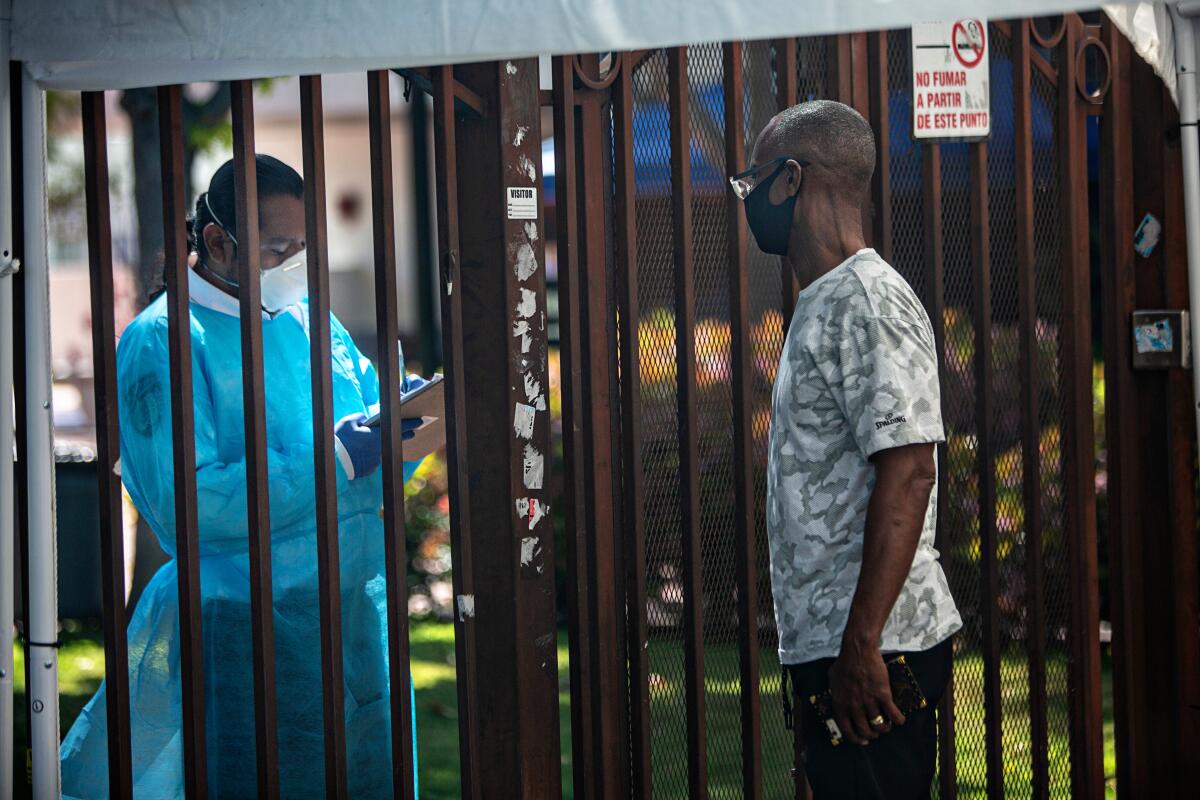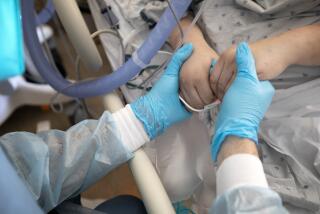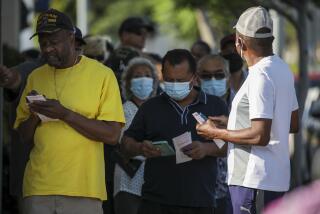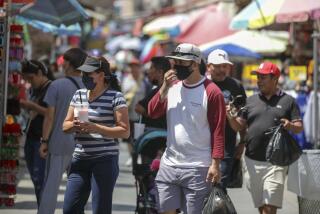L.A. County suffers a disproportionate share of coronavirus deaths amid a grim week

- Share via
Even as the growth of coronavirus cases appears to be slowing in California, the numbers of dead reached new highs this week with the toll being particularly grim in Los Angeles County.
Coronavirus-linked fatalities hit another one-day high in Los Angeles County on Thursday as health officials confirmed 52 additional deaths for a total of 457. It marked the third straight day the county has seen a record number of deaths, according to the county’s tally.
While the coronavirus crisis began in the Bay Area, Los Angeles County now accounts for an outsized number of deaths despite its large size.
The county represents a quarter of California’s population but has been the site of almost half of the deaths due to COVID-19, a Times data analysis found. The five-county Southern California region accounts for roughly 60% of the deaths in California due to the coronavirus, even though it makes up just 48% of California’s population.
Those numbers led to California recording its worst one-day death total on Wednesday, at 101 reported fatalities.
“The increase this week on the number of deaths attributed to COVID-19 is distressing and a stark reminder of the devastation caused by COVID-19,” said Barbara Ferrer, Los Angeles County’s public health director.
In Los Angeles County, 88% of those who have died as a result of COVID-19 had other health problems. That underscores “the need for all of us to work together to make it possible for those who have underlying health issues to remain in their homes,” she said.
County officials have said that while strict stay-at-home orders have slowed the spread of coronavirus, they remain worried about the possibility of more outbreaks. They forecast last week that up to 30% of the county’s 10 million residents could be infected by midsummer without more behavioral changes, such as reducing shopping trips.
Institutional settings such as nursing homes have been major hot spots for the virus in Los Angeles County. Roughly 30% of the deaths in L.A. County have occurred in nursing homes. In Long Beach, that number is more than 70%. All of Pasadena’s 16 fatalities have been associated with long-term care facilities.
Nursing homes have been a crisis point elsewhere. Bay Area prosecutors have opened an investigation into the Gateway Care and Rehabilitation Center in Hayward, where 13 people have died. Forty-one residents and 26 staff members there have tested positive.
State and local officials have said that California’s coronavirus outbreak should be peaking over the next few weeks and are already beginning to talk about the conditions needed to lift some of the restrictions.
If those forecasts hold, the state would fare dramatically better than places such as New York, New Jersey and Michigan. New York has seen more than 14,000 coronavirus deaths, compared to more than 970 in California. Officials have attributed early adoption of stay-at-home rules for part of that difference.
Daily tallies of new cases in California suggest the spread of the virus is slowing. So does the number of COVID-19 patients in intensive care units, which has remained between 1,100 and 1,200 since April 7.
Gov. Gavin Newsom said Thursday that 1,191 Californians were in intensive care as of Wednesday — a 1.4% day-to-day increase — but that the overall number of patients hospitalized ticked down by almost 1% to 3,141.
“That’s good news but, again, I caution everybody: One day’s data does not make a trend,” he said.
The increase in hospitalizations over the first 15 days of April appeared to be driven by the five counties in Southern California, where the number of those hospitalized doubled from 1,058 to 2,161. But the nine-county Bay Area has seen a flat number of those hospitalized for COVID-19 for those two weeks, staying between 397 and 471.
The first two weeks of April have been more stable than the rapid increases in new cases seen in March. The Southern California region has added between 500 to 1,000 cases daily during the first two weeks of April, while the nine-county San Francisco Bay Area has added between 100 to 300 cases daily. San Diego County has added fewer than 150 cases daily, and the seven-county Sacramento area hasn’t added more than 100 cases since April 1.
But as the death toll increases, there are growing concerns about racial disparities among coronavirus victims.
The California Department of Public Health released data this week showing that the coronavirus is killing black residents in disproportionate numbers — a trend mirrored by Los Angeles County and other local cities.
In numbers released this week, black Californians accounted for 7% of the state’s COVID-19 cases and 12% of its coronavirus-related deaths. Blacks make up 6% of the state’s population.
State officials said a fuller picture of racial demographics are coming into perspective as more information is included in COVID-19 reporting. As of this week, officials said data on race and ethnicity were complete for 65% of cases and 87% of deaths reported to the state.
More to Read
Sign up for Essential California
The most important California stories and recommendations in your inbox every morning.
You may occasionally receive promotional content from the Los Angeles Times.















